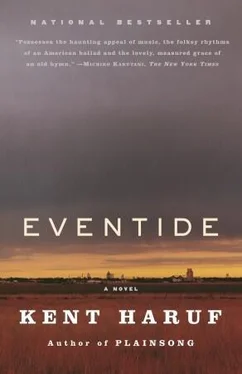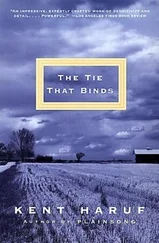I don’t want to, the little girl said.
Why don’t you?
I want to stay with you.
All right. But you two go out. I’m not feeling very well, she said. She had begun to cry again. They watched her out of the corners of their eyes. Go on, she said. Please.
I want to stay too, Dena said.
No. One’s enough in here. Go on now. You and DJ do something outside.
OUTSIDE, THEY PUSHED THE BIKE AROUND THE CORNER of the house to the backyard and stood by the garden looking at the alley. Let’s go someplace else, Dena said.
I don’t want to go downtown. I don’t feel like seeing anybody right now.
We don’t have to see anybody, she said.
They walked out into the alley in the tire tracks running on either side of the weeds that grew down the center of the gravel like a low hedge and passed the backyards of the old widow women and the vacant lot next door and then his grandfather’s house and the vacant lot beyond. At the street they crossed over and entered the alley in the next block. On the left was an old blue wooden house, its backyard overgrown with lilac bushes and mulberry trees. Nobody had lived in the house for years. The porch screen was hanging loose and there were scraps of metal scattered under the bushes. An old black Desoto had been shoved under a mulberry and its pale-green windows had been starred and shot through by boys with pellet guns. All the tires were flat. At the alley was a small unpainted shed.
They peered in through the little window, the panes old and wavy, coated with dirt and brown cobwebs. They could only make out a push mower and a garden tiller. The door creaked open when they lifted the metal latch and they went in through long strings of cobwebs. The shed was dark and shadowy inside, with a dirt floor black with oil. There was a shelf along the back wall. Beneath it a whitewall tire. There were woven baskets with wire handles stacked one inside the other, and a rusted hand saw, and a carpenter’s hammer, both its claws broken off. Below the window was a dead house sparrow, dry as dust on the dirt floor, weighing nothing. They looked at everything, lifting the tools and setting them back in their outlines of dust.
We could make something of this, Dena said.
He looked at her.
This place here.
It’s just dirty in here. It’s dark.
We could clean it out, she said.
He looked at her and she seemed dim and shadowy in the thin light coming through the window. He couldn’t see her eyes. She had lowered her face. She was holding something in her hands, but he couldn’t see for sure what it was. We could bring things here, she said.
Like what?
I don’t know, she said. You don’t have to if you don’t want to.
She was looking down at whatever it was she had in her hands.
Maybe I do, he said.
It was an old red coffee can. He could see that now and she was poking around to see what was inside. In the dim light he studied her soft unknowable face, a girl’s face. Didn’t you hear me? he said.
What.
I said maybe I do.
I heard you, she said.
SHE HAD THE AUNT WHO LIVED OUT IN THE COUNTRY east of Holt and she had the uncle who lived in town, who was Hoyt Raines, on her mother’s side.
On a windy afternoon at the beginning of October he was waiting on the front porch of their trailer when they came home from Duckwall’s. He was wearing a black baseball cap with purple trimming and his face was hidden beneath the bill.
He was a tall thin man with the same dark lank hair that Betty had and he had her own pale blue eyes. He worked in town and out in the country on construction outfits and for tree-trimming operations, and in the summer months he joined harvesting crews that began cutting wheat in Texas and finished in Canada. He almost never worked at any one job longer than a single season. He’d work a while and get laid off for one reason or another, or he’d get disgusted and quit on his own. When he was out of work he’d lounge about in his rented rooms on the south side of Holt, living on his last paycheck until the money ran out. The past five or six months he’d been milking cows for a dairy north of Holt, and for him this was almost heroic, the way he kept on. Even so — and this was more like him — every three weeks or so he’d come into the milking parlor at six or seven in the morning, arriving in his own good time, arriving late and still drunk and still wooden-eyed, smelling of the cheap bar whiskey he’d drunk the night before, and in this stupefied state he’d begin milking the expensive Holstein cows, cleaning the milk-dripping udders with a wet rag and attaching the milker-cups in clumsy haste, and the last time this had happened, it was two weeks ago, he had milked one of the sick cows into the fresh tank and the manager had had to empty the entire tank or risk being discovered and fined. Fourteen hundred gallons of fresh milk had had to be run out into the floor drain. The manager fired him on the spot — told Hoyt to go home, said he was never to come back, he didn’t want ever to see his miserable face again. Well goddamn it, Hoyt said, what about my paycheck? You still owe me for this week’s pay.
It’ll be in the mail, you sorry son of a bitch, the manager said. Now get the hell out of here.
That day he went back to town still smelling faintly of whiskey, with also the reek of the milking parlor, that peculiar intense distinct odor which hung on in his clothes and hair and which even soap and water couldn’t remove, and made his first stop at the Holt Tavern on Main Street though it was still only the middle of morning. There he began to drink and to explain to anyone who would listen — three old men and a couple of sad-eyed old women were already there — what had happened.
Now he was sitting on the porch step in the sun, smoking a cigarette, when his niece and Luther walked up across the weedy yard.
Looky who’s here, Luther said.
I wondered when you two would decide to come home, Hoyt said.
We been downtown buying a new phone.
What do you want a phone for? Who’s going to call?
We got to have a phone. I’m starting a business.
What kind of business?
A mail-order one. Home-based.
Hoyt looked at him. Well, he said, if you want to believe that. He stood up and turned to Betty. Aren’t you going to give your uncle a hug?
She stepped toward him and he hugged her hard, then let her go and slapped her sharply on the rear.
Don’t, she said. My husband don’t like people messing with me.
You think Luther cares?
You better mind your manners.
That’s right, Luther said. You ought to mind your manners around here.
What’s crawled up your ass? I come over to see you two. I got something I want to propose. And here you’re already giving me a raft of shit.
Well, Luther said. You shouldn’t say that.
What you want to propose? Betty said.
Let’s get out of this wind, Hoyt said. I can’t talk out here.
THEY MOVED INSIDE THE TRAILER AND SAT AT THE kitchen table after Betty cleared a place for her uncle. He took off his cap and set it on the table and ran his fingers through his hair as he looked around. You need to clean this place up, he said. Good Christ, look at it. I don’t see how a person can live like this.
Well, I ain’t feeling very good, Betty said. My stomach keeps hurting me. I can’t hardly sleep at night.
She been taking pills for it, Luther said. But it don’t seem like it makes no difference. Does it, honey.
It ain’t yet.
That don’t mean you have to live like this, Hoyt said. You could do some of it yourself, Luther.
Luther didn’t respond. He and Betty stared across the room as if there were something hanging on the wall they had failed to notice.
Читать дальше








